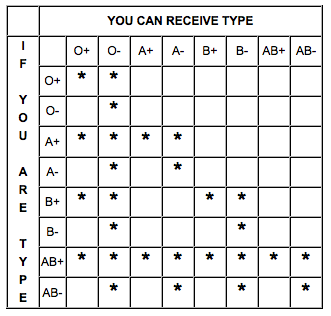There’s Nothing Scarier Than a Blood Shortage
| Tweet |
By Julie Ruel, Social Media Manager, Stanford Blood Center
Each day, the recruitment team at Stanford Blood Center (SBC) works hard to help ensure we have blood products available to those in need. “We do this by connecting with donors and inviting them to return. It sounds simple enough, but the reality is that this mission takes time, strategy, and creativity,” explains Karen Paganelli, recruitment manager at SBC. The hospitals’ needs fluctuate from day to day and we must constantly keep on top of our inventory to make sure the right type is available at the right time for the right patient.
One constant challenge we face is the need for Rh-negative blood types (those that lack the Rhesus D antigen: O-, A-, B-, AB-). Rh-negative (or Rh-) red blood cells are important because of their compatibility with both Rh+ and Rh- blood types (see compatibility chart below for specifics). Only a small percentage of the population (around 15%) is part of this group. However, from week to week, we need approximately 20-22% of our visiting donors to be Rh-. Because these percentages are unbalanced, our pool of eligible donors in this blood group can be quickly depleted.
O-negative red blood cells specifically
We reach out to our O-negative donors often and here’s why. These folks have the universal blood type. In simple terms – their blood can safely be transfused to anyone, regardless of that person’s blood type. Imagine an emergency situation, say, an automobile accident. People need blood and they need it right away. Without time to test their blood type, doctors must reach for the bag of O-negative, the only safe choice in this type of situation.
In addition, because only about 6 out of 100 people are part of this group, it’s that much more difficult to keep a sufficient inventory.
Rh+ blood types
The fact is, all blood types are needed. We couldn’t produce an article about the importance of blood donations without mentioning Rh+ blood types. We + folks are part of a much larger population which makes us very important as well. Think of it this way – the more common your type, the more people there are that need your type!
The need for blood will never go away. There will always be surgeries to perform, emergencies that happen, and people with conditions who rely on blood products for day-to-day survival. It’s critical that we make sure blood is stocked in our hospitals’ refrigerators and ready to go at any given time. They rely on us and we rely on you!


